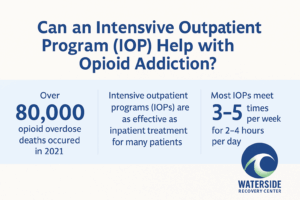Even when you keep up appearances—showing up for work, managing family obligations, answering texts on time—there’s a part of you no one sees. Maybe it’s the late nights, the constant calculations about supply, or the worry that someone will notice the small cracks in your routine. You don’t see yourself as someone “in crisis,” but you know you’re not living freely either.
For many high-functioning people using opioids, the idea of stepping away from life for treatment feels impossible—or unnecessary. That’s why an intensive outpatient program IOP can be the bridge between living with the weight of addiction and finding a way forward that doesn’t dismantle your entire life.
Understanding What an IOP Really Is
An intensive outpatient program is a structured treatment format that provides the intensity of therapy and medical support you’d expect from inpatient care—without requiring a full-time stay at a facility.
Typically, IOPs involve:
- Multiple sessions per week, usually 3–5 days
- 3–4 hours per session, often in the afternoons or evenings
- Group therapy, where you learn from and connect with others facing similar challenges
- Individual counseling, to address your specific needs and triggers
- Skill-building and relapse prevention, focused on coping strategies and lifestyle changes
- Optional family involvement, helping to repair trust and communication
For high-functioning individuals, this flexibility means you can maintain work schedules, care for loved ones, and meet obligations while actively addressing your opioid use.
Why IOP Can Work for Opioid Addiction
Opioid addiction isn’t just about chemical dependence—it’s about patterns, rituals, and a relationship with the substance that has often been built over years. An IOP addresses the addiction from multiple angles:
- Medical and Psychological Support – You’re monitored for withdrawal symptoms, mental health needs, and progress over time.
- Practical Coping Skills – Sessions focus on real-world strategies for avoiding triggers, managing cravings, and rebuilding healthy habits.
- Peer Connection – Talking with others who understand the double life of a high-functioning addict can break down the isolation that feeds the addiction.
This layered approach means treatment isn’t just about stopping use—it’s about building a sustainable way of living without opioids.

Breaking the Isolation Without Losing Your Privacy
One of the hardest parts for high-functioning people is letting anyone see what’s really going on. In IOP, you choose to step into a confidential space where everyone is there for the same reason: to get better.
You don’t have to explain why you’re not “rock bottom.” You don’t have to perform recovery in a certain way. The program is about your needs, your readiness, and your pace.
“At first, I was terrified someone would recognize me,” one former client shared. “But after the first week, I realized everyone else was too focused on their own work to judge me. It was a relief just to be honest in one place.”
The Accountability That Keeps You Moving Forward
With opioid addiction, it’s easy to promise yourself you’ll make changes—tomorrow. In IOP, there’s a built-in rhythm that makes tomorrow a little harder to avoid. Regular sessions mean you’re checking in multiple times a week with counselors and peers. That frequency builds momentum and makes it less likely that days will quietly turn into weeks without action.
Accountability isn’t about being watched—it’s about having people who notice and care when you’re struggling.
Local Support That Fits Your Life
If you live in Plymouth County, you don’t have to travel hours or completely rearrange your life to get help. Local programs like Waterside Recovery offer flexible afternoon treatment options so you can access the benefits of an IOP without disrupting work or family responsibilities.
If you’re looking for intensive outpatient program IOP in Plymouth County, MA, you’ll find that having care close to home makes it easier to stay engaged and connected to your support network outside of treatment.
You Don’t Have to Wait for a Crisis
One of the most damaging myths about addiction is that help only comes after a “rock bottom” moment. For many high-functioning people, that moment never arrives—at least not in the dramatic way it’s often portrayed. Instead, the slow erosion of joy, energy, and self-respect becomes the quiet bottom.
If you’re tired, if you’ve noticed the creeping cost of your use, or if you simply want to stop wondering when someone will notice—IOP can be a first step toward something better.
FAQ: Intensive Outpatient Programs for Opioid Addiction
1. What’s the difference between IOP and inpatient rehab?
Inpatient rehab requires you to live at a treatment center full-time, often for 30 days or more. IOP allows you to live at home, attend work or school, and come to scheduled treatment sessions several times a week.
2. Can I still work while in IOP?
Yes. Many IOPs, including afternoon programs at Waterside Recovery, are designed to fit around work schedules.
3. Is IOP effective for opioid addiction?
Yes—especially for those who are motivated to change but need flexibility. IOP provides medical oversight, therapy, and relapse prevention tools that are proven to help with opioid use disorders.
4. Will anyone know I’m in treatment?
IOP sessions are confidential. The only people who will know are those you choose to tell, unless you’ve been referred by a legal or medical authority.
5. How long does IOP last?
Most programs run for 8–12 weeks, but your length of stay depends on your progress and needs.
6. What if I need more support after IOP?
You can transition into ongoing outpatient therapy, peer support groups, or, if needed, a higher level of care like partial hospitalization.
Call (866)671-8620 or visit to learn more about our intensive outpatient program IOP services in Plymouth County, MA.


